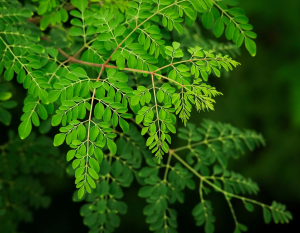
Moringa Tree and Cancer: Side Effects and Research Studies
Many people with cancer inquire about herbal medicine as a complementary therapy after reading anecdotal reports of herbal cancer cures

Many people with cancer inquire about herbal medicine as a complementary therapy after reading anecdotal reports of herbal cancer cures online. One such herb, known as moringa tree, is reported to prevent and cure cancer. Research has investigated moringa as a treatment for cancer, asthma, cardiovascular disease, diabetes and other diseases. Moringa is a plant […]
Many people with cancer inquire about herbal medicine as a complementary therapy after reading anecdotal reports of herbal cancer cures online.
One such herb, known as moringa tree, is reported to prevent and cure cancer.
Research has investigated moringa as a treatment for cancer, asthma, cardiovascular disease, diabetes and other diseases.
Moringa is a plant native to India, but it is grown worldwide in tropical and subtropical regions.
There are 13 species of moringa that range in size — from leafy shrubs to tall trees. The most commonly harvested species, M. oleifera, is a small, fast- growing tree.
Cancer research on moringa has been conducted in test tubes and in mice, but not in humans. The studies involving test tubes and mice show moringa can kill several different types of cancer cells, but this hasn’t been confirmed in human clinical trials.
There are no studies about the effect of moringa on mesothelioma.
What Are the Side Effects of Moringa?
While the leaves are perfectly safe, consuming large quantities of the bark or pulp may be harmful.
Moringa side effects may include:
Moringa leaves also increased the risk of liver and kidney damage in rats. Do not consume moringa if you are pregnant, taking the diabetes drug Januvia (sitagliptin) or taking drugs that are substrates of the cytochrome P450 family of enzymes.
All cancer research involving moringa has been conducted on mice or on cancer cells grown in labs, but not in humans.
This means the available information on moringa and cancer is theoretical and hasn’t been proven or disproven in human clinical trials.
Cancer research on moringa tree has involved cancer prevention and treatment:
The levels of vitamins C and A, which are antioxidants, help protect against cell damage caused by chemicals in the body, known as free radicals, which can play a role in the development of cancer.
Vitamin C helps the body maintain a healthy immune system, while vitamin A can help maintain mucous membranes that protect against infections in the respiratory and digestive tracts.
Moringa leaves also contain amino acids that may boost the immune system. This may help patients undergoing treatments such as chemotherapy, but no research has been conducted in this area yet.
Moringa leaves can be eaten fresh, cooked or crushed, and they can be stored as dried powder for several months without loss of nutritional value.
Moringa leaves can be blended into fruit smoothies or used as a replacement for spinach in most recipes. Dried moringa powder may be added to a curry recipe and served over rice.
According to ethnobotanical records, moringa has been used by herbalists to help with a variety of symptoms, including common mesothelioma symptoms such as difficulty breathing, cough and other respiratory complications.
Additional scientific research and clinical studies are needed to understand the potential of moringa to prevent and treat cancer.
Keep in mind that cancer treatments affect people differently. As with any complementary treatment, it is best to talk with your doctor before adding moringa to your treatment regimen or diet.
If you experience any side effects, you should seek medical attention immediately.
Moringa Leaves – 16 Health Benefits That You Should Know
Medically reviewed by Dr. Nikita Toshi
Last updated: Aug 26, 2024
Moringa tree is also known as the ‘miracle tree’ and there is a good reason why. The leaves, fruit, sap, oil, roots, bark, seeds, pod and flowers of the tree have medicinal properties. The products from the tree have many uses. It is also known as the ‘drumstick tree’. It is found mostly in Asia, Africa, and South America.
Friendly Reminder: The information shared here is for educational purposes only and the reader should consult a registered medical practitioner before implementing any changes to their health routine.
The drumstick leaves commonly known as moringa leaves are nutritionally very rich, leaving behind carrots, oranges, and even milk in terms of nutritional value. The leaves find many uses in Indian cuisine as they are versatile and can be incorporated into the diet in many ways. Adding them to juices and using them as stir-fried vegetables are the most common ways in which they are eaten. When consumed in their natural form, the moringa leaves have no side effects.
Moringa leaves are rich in vitamins A, C, B1 (thiamin), B2 (riboflavin), B3 (niacin), B6, and Folate. They are also rich in magnesium, iron, calcium, phosphorus, and zinc.
One cup of moringa leaves will contain 2 grams of protein, magnesium (8 percent of the RDA), Vitamin B6 (19 percent of the RDA), Iron (11 percent of the RDA), Riboflavin (11 percent of the RDA), and Vitamin A (9 percent of the RDA).
Moringa leaves are rich in amino acids, the building blocks of proteins. 18 types of amino acids are found in them and each of them makes an important contribution to our wellbeing.
Inflammation is how a body naturally responds to pain and injury. Moringa leaves are anti-inflammatory in nature due to the presence of isothiocyanates. They have niazimicin which is known to reign in the development of cancer cells. Inflammation is the root cause of many diseases like cancer, arthritis, rheumatoid arthritis, and many autoimmune diseases. When we suffer an injury or infection, the body suffers increased inflammation.
Basically, it is a protective mechanism against trauma but because of a wrong lifestyle and an unhealthy diet, inflammation can increase in the body. Long-term inflammation leads to chronic health issues. Eating moringa leaves helps to reduce inflammation.
Moringa leaves have anti-oxidative properties and protect against the damaging effects of free radicals present in the environment. The damage caused by free radicals is responsible for many chronic diseases like type 2 diabetes, heart problems, and Alzheimer’s.
Moringa leaves are rich in vitamin C and beta-carotene that act against free radicals.
They also have Quercetin which is an antioxidant that helps to lower blood pressure. Another antioxidant that is present in moringa leaves is Chlorogenic acid which helps to stabilize blood sugar levels post meals.
A study in women showed that taking 1.5 teaspoons of moringa leaf powder regularly for three months had shown a significant increase in blood antioxidant levels.
Sustained high blood sugar levels lead to the development of diabetes in individuals. Diabetes, in turn, can cause heart problems and organ damage in the body. To avoid this, it is good to keep the blood sugar levels in check. Moringa leaves are a perfect resource for that as they stabilize the blood sugar levels due to the presence of isothiocyanates.
Apart from oats, flaxseeds, and almonds, moringa leaves are a dependable remedy against high cholesterol. Cholesterol is the major reason why people suffer from heart diseases and eating moringa leaves has been known to show considerable improvement against high cholesterol levels. Moringa oleifera can lower those levels and protect against the risk of heart disease. Pregnant women usually experience higher levels of cholesterol, which can in turn increase the risk of developing gestational diabetes during their term. What is gestational diabetes? It is a type of diabetes that is first detected in pregnant women who did not have diabetes before they were pregnant. Moringa leaves can certainly be included in the diet for gestational diabetes.
Those who have tuberculosis can benefit greatly from moringa leaves as they reduce the negative effects of anti-tubercular drugs. The leaves accelerate the repair of the liver
cells. The leaves have a high concentration of polyphenols that protect against oxidative damage to the liver and may even reduce it. They increase the protein levels in the liver.
The liver is the site of blood detoxification, fat metabolism, and nutrient absorption and it can function properly only if the liver enzymes are normal. Moringa leaves stabilize these liver enzymes.
In many parts of the world, arsenic contamination is a common problem. Arsenic has found its way in our systems through many food items, particularly rice.
Long-term exposure to this element can lead to the development of cancer and heart disease. Research on lab animals has shown that moringa leaves combat the effects of arsenic toxicity.
Moringa leaves are beneficial against digestive disorders. Those who suffer from constipation, bloating, gas, gastritis, and ulcerative colitis should add Moringa leaves to their diet.
The leaves have antibiotic and antimicrobial properties which make them an ideal remedy against digestive disorders. Even the high amount of B vitamins in the leaves helps in improving digestion.
Moringa leaves are rich sources of calcium and phosphorus. Both of these elements are needed for good bone health. Since moringa leaves have an anti-inflammatory nature, they help combat arthritis and may even heal bones that are damaged.
Moringa oleifera also fights against osteoporosis and keeps bones and teeth strong
Moringa leaves are antiseptic and fight off many bacterial infections. They are even beneficial towards wound healing and help to heal bruises, minor cuts, and burns quickly as they reduce the clotting time.
Moringa leaves for pregnancy can be beneficial due to their nutrient-rich composition, potentially supporting the health of both the expectant mother and the developing baby. In traditional Ayurvedic medicine, moringa leaves were used to increase lactation in nursing mothers. Since they are a rich source of protein, important vitamins, and essential nutrients, consuming moringa leaves is very good for the health of the mother and the baby.
Moringa leaves increase fat burning in the body. They slim down the person without depleting energy reserves. This keeps the person feeling buoyant and nourished. They reduce cravings for food and boost metabolism. They also lower cholesterol.
Due to an abundance of antioxidants and nutrients, moringa leaves improve the health and appearance of skin and hair. They add suppleness to the skin and shine to the hair. The antioxidants present in moringa leaves reduce the appearance of fine lines and wrinkles on the skin. They have about 30 antioxidants present. Not just this, a paste of moringa leaves for hair. when applied to the scalp reduces dandruff and adds life and bounce to dull, lifeless hair. The leaves also strengthen the hair follicles. Moringa leaves for skin also have proven to be beneficial for acne-prone skin, however, more research is required. This is why moringa leaves are part of many cosmetics. They improve the skin tone and add a glow due to their purifying nature and therapeutic properties.
Read More: 7 Home Remedies for Glowing Skin
Many nervous disorders have been known to show positive results with the moringa leaves uses. They support brain health and work as neuro-enhancers. The high concentration of vitamins E and C combat neural degeneration and help improve brain function. Those who have a migraine or suffer from recurring headaches must eat moringa leaves regularly. These leaves also work as mood balancers as they stabilize the production of neurotransmitters like serotonin, dopamine, and noradrenaline which are important for memory, mood, and for stimulus-response.
Moringa leaves are natural cleansers and help to detoxify the system. This helps to keep the body and increases immunity against various infections. They also increase the energy levels in the body.
Moringa leaves provide a powerful punch of nutrition and have an anti-inflammatory nature. Their antioxidative properties combined with their cellular-health protective properties make them a new ‘superfood’. They suppress the production of inflammatory enzymes and lower sugar levels. Make these a regular part of your diet to reap rich health benefits.

Many people with cancer inquire about herbal medicine as a complementary therapy after reading anecdotal reports of herbal cancer cures

Spirulina has so many benefits to the human body, it is sometimes difficult to believe, let alone cover in a

In 1974, the united nations have discovered Spirulina and declared it as the number one food to distribute among malnourished

Clinical studies on thousands of diabetes patients around the world have shown a number of benefits that make Spirulina a